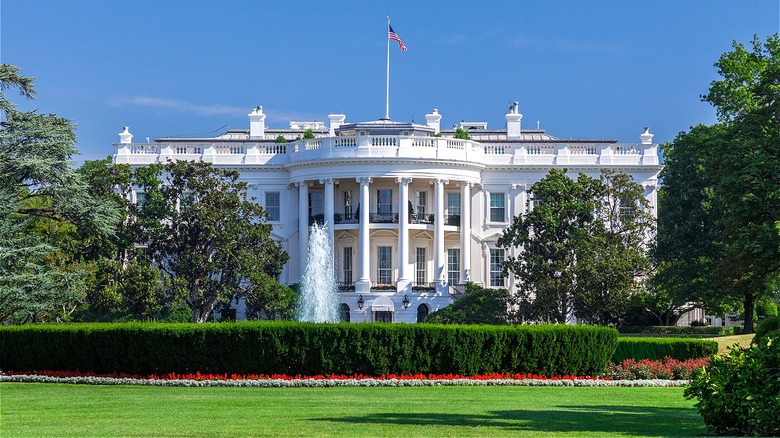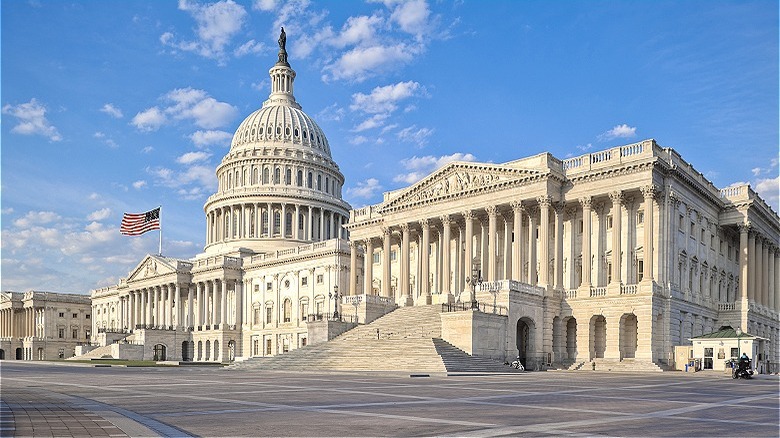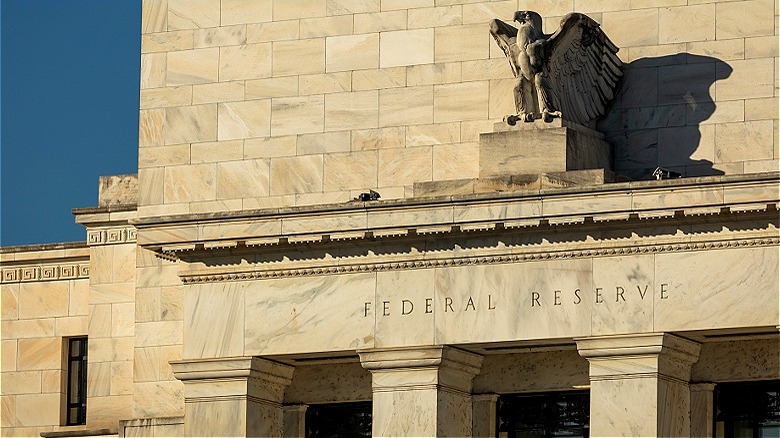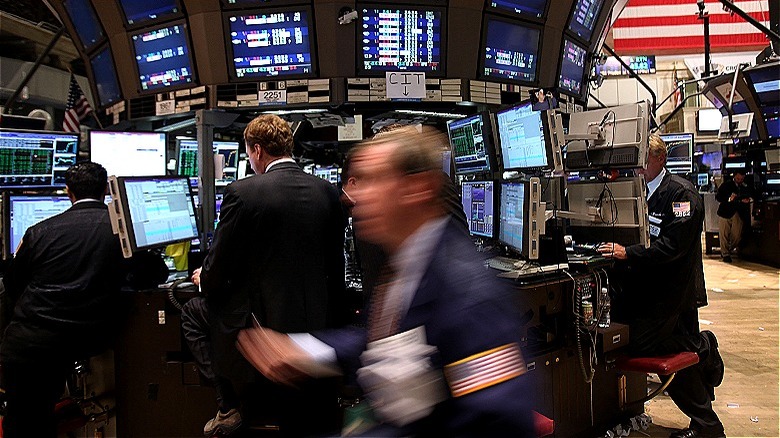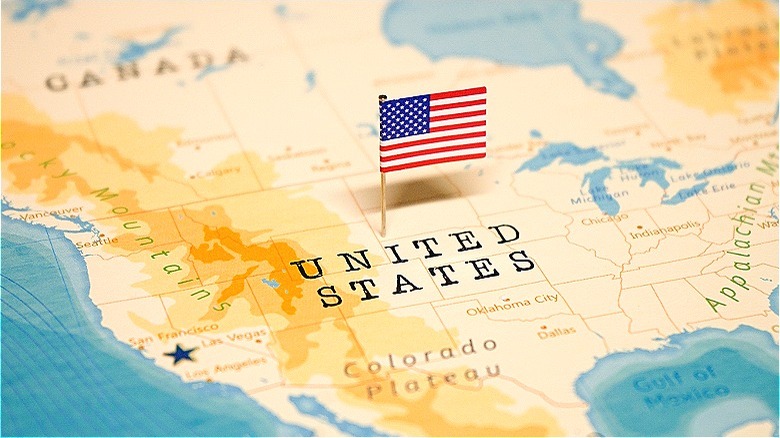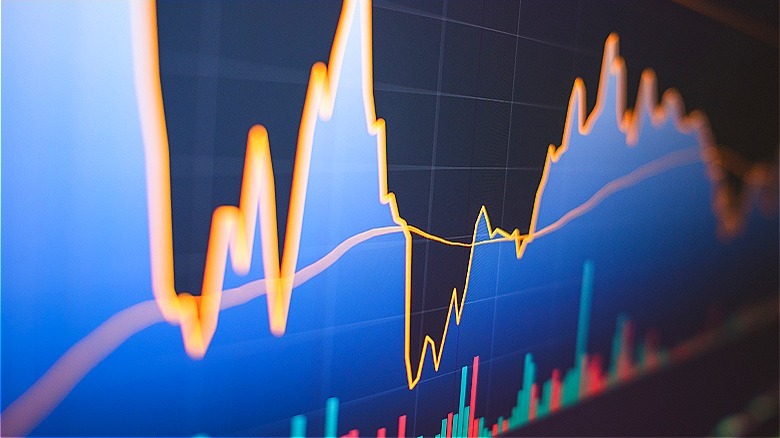Does The President Of The United States Affect The Stock Market?
Love them or hate them, there's no debating that a sitting president tends to take the blame (and get the credit) for a LOT. While some decisions, such as administrative policy, definitely belong to them, others do not. This brings us to perhaps the most discussed post-pandemic topic in the world — the economy. While many might assume that a sitting president has an undue amount of influence and decision-making impact on the economy, the reality is decidedly different.
In actuality, presidents have a small and largely indirect ability to influence the economy, and by extension the stock market, but this hasn't stopped presidents throughout history from being blamed or for taking credit for the market's failures and successes. In fact, the economy has a monumental impact on the popularity and the reelection chances of incumbent presidents. Campaign manager James Carville in 1992 famously coined the mantra of then-President Bill Clinton's presidential campaign, "It's the economy, stupid."
The main ways a U.S. president can influence the stock market comes down to nominations and appointments. Since the president appoints cabinet secretaries and trade representatives, there's a good chance a president's cabinet will have similar economic views as the administration. Plus, the president nominates the chair of the Federal Reserve. While the Fed operates as an independent agency (that sets monetary policy) it stands to reason the president's choice would be in line with their views. With this in mind, it's important to realize that many other government bodies and agencies have a much larger say in economic decisions.
Congress
The most important and significant government influence on economic and stock market factors actually comes from Congress. In fact, it's enshrined in the U.S. Constitution that Congress handles all laws, which means Congress has responsibility for things like setting tax rates, passing spending bills, and writing the laws that ultimately regulate the nation's economy. Even though the president has veto power over legislative acts, Congress has the ability to override presidential vetoes with a two-thirds majority. This means the final decision on all financial laws in the country ultimately lies with Congress. Most notably, Congress is the body that approves the lifting of the country's debt ceiling in order to avoid the U.S. defaulting on its loans.
However, this raises significant questions about Congress and its ability to participate in the stock market as individuals. Given that members of Congress have considerable influence (not to mention extensive insider access to information and policies that affect the market), the lack of regulatory guidelines and restrictions on their ability to profit from the market is concerning. Recent research has even shown that the stock market investments from congressional representatives can and do influence the stock market's overall volatility.
On a larger scale, "The Congressional Effect" also impacts stock prices. This phenomenon, which was coined by New York trader Eric T. Singer, shows a direct correlation between stock performance and volatility and the operating schedules of Congress. In fact, according to Singer, the S&P 500 Index performs better, on average, when both houses of Congress are out of session.
Federal Reserve
The Federal Reserve Act of 1913 gave the Federal Reserve the authority to formulate monetary policy for the country. This, along with regulating banks and managing the country's money supply, serves as the Fed's main functions. As the U.S.' central bank, the Fed primarily uses three tools to support its mission: open market operations, the discount rate, and reserve requirements. These tools allow the Fed to determine the supply and demand of money that banks hold at Federal Reserve banks. This, in turn, allows the Fed to determine things like federal fund rates, interest rates, and exchange rates, which can all heavily influence both inflation and the economy as a whole.
Even though the president appoints the chair of the Federal Reserve, it's important to know it's an entirely independent government body. This means the appointment of the chair is largely where the president's influence ends. With that in mind, the Fed is primarily interested in ensuring economic growth alongside low inflation and unemployment, but the ways each chair might choose to tackle those pursuits can obviously vary. More recently, the Fed has been behind the interest rate hikes that have affected many borrowers in the country, as a tactic to try and slow down inflation. According to the Wall Street Journal, between March 2022 and July 2023, the Fed raised rates at 11 of 12 of its policy meetings, leaving its federal funds rate at a 22-year high (between 5.25% and 5.5%). As a result, inflation in the U.S. has cooled.
The stock market
When you hear about the stock market, you're more than likely thinking about the New York Stock Exchange (NYSE) and the Nasdaq. For starters, the NYSE is the largest equities-based exchange in the world based on the total listed market cap. This means that the NYSE, operating as an auction market, lists the most important publicly traded companies in the U.S. Despite operating as a private organization for many years, the NYSE is currently a publicly traded entity that was purchased by the Intercontinental Exchange (ICE) for $11 billion in 2013. On the flip side, the Nasdaq is a dealer market that operates as a global electronic marketplace in which specialist market makers compete with one another on trading securities. Nasdaq also notably includes most of the world's tech giants like Apple and Google.
Combined, these two exchange markets make up the bulk of all stock trading in North America. Stock volatility and speculation derive from the traders and participants in these exchanges rather than from the president of the United States personally. For instance, the post-pandemic uncertainty within the stock market has been largely due to speculative exchanges ahead of anticipated interest rate hikes by the Federal Reserve, which the president has no control over. These speculative trades have been fundamentally influenced by the inflation rates affecting Americans in the nation's post-pandemic economy. This goes to show that the stock market is more influenced by large-scale monetary policy and economic developments as opposed to any individual.
Government policy
Large-scale government policy (which can be influenced by and created from a combination of the above-listed groups and parties) can have an important impact on how the stock market responds and trades. Since the government is ultimately a large group project, the overall takeaway for average Americans can differ significantly from what any one group might be doing. Spending bills passed by Congress, in particular, can lead to heightened investor interest since government spending can offer a boon to consumers who, in turn, bolster the market. An upswing in the market can ultimately be beneficial for the overall economy. Any policies that might leave more money in the American consumer's pockets can ultimately boost the economy through increased personal spending. As many Americans have seen in the post-pandemic period, the Fed has had an increased influence on the economy as well, as it has attempted to curb inflation.
With that in mind, government policy can include myriad tactics and options to help regulate the country's economy. This can include boosting currency short-term or even intervening/bailing out entire failing economic sectors and industries (as we've seen with both banks and airlines) in order to prevent a larger economic collapse. Similarly, government subsidies, tariffs, and taxes can all affect product prices and industry success. For instance, tax cuts (which can be included in congressional spending bills) can also offer a form of financial stimulus for the economy — depending on what groups and socioeconomic populations benefit from them.
The state of the economy
It's clear there are a lot of different groups and interests that all play a part in creating the economy we live in, rather than the president singularly. The complicated web and relationship between these different agencies, bodies, and policies can be difficult to untangle. This can be especially true when, as a consumer, you might not be personally experiencing the effects of certain economic policies or trends. A good example is the 2023 trend of increased wages. According to a 2023 Bankrate survey, despite the fact that 64% of Americans received a pay increase, 60% reported their pay didn't keep pace with expenses due to inflation. Between inflation, wages, and interest rates, it can be difficult for the average person to know who exactly to blame for their financial uncertainty.
Similarly, as inflation takes its time in slowing down, the average American continues to feel the pinch at the grocery store and unable to buy a house due to interest rates. This can not only lead to frustration and financial anxiety, but it can and does affect a person's opinion of the president. This is exactly how and why the sitting president is usually credited and/or blamed for the current state of the economy. Even though inflation was due in large part to the pandemic, interest rates are a result of the Fed, and stagnant wages continue to be a result of congressional and policymaker failures to support better labor standards and bargaining power, the president ultimately is an easier figure to blame.
